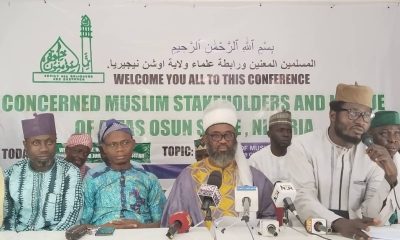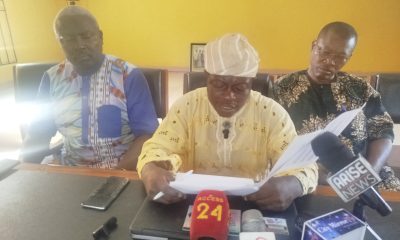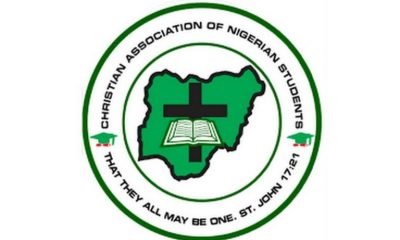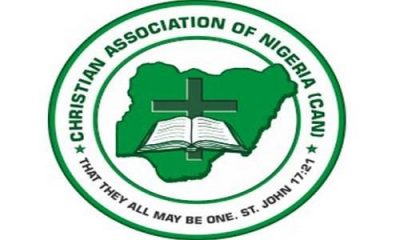News
CAN, Sukuk And Alleged Islamisation Plot

CAN, Sukuk And Alleged Islamisation Plot
By Yinka Salaam
The ever combative Christian Association of Nigeria (CAN) is once again accusing the Muhammadu Buhari-led Federal Government of plots to ‘Islamise’ Nigeria through the backdoor, using the Sukuk Islamic bond as handle.
CAN’s latest allegation is contained in a statement issued on Tuesday in Abuja through its general secretary, Rev. Musa Asake.
The Christian body called on the Federal Government to without delay abrogate the laws and framework behind the bond, vowing to seek legal redress should government fail to do that.
What is Sukuk
Sukuk are investment certificates that give Shariah compliant returns on investments.
On the FGN Debut Sovereign Sukuk, the Federal Government issued its first Sukuk (non-interest lease assets facilities) between Thursday 14th September, 2017) and Wednesday 20th September after decades of advocacy by Muslim Finance experts for non-interest financial instruments like the Sukuk.
This was followed by few newspaper advertisements of the offer.
FGN Sukuk has been certified as Shariah compliant by the Financial Regulation Advisory Council of Experts (FRACE) of the Central Bank of Nigeria.
The Council after painstaking review of the structure and contract documents with the legal and financial teams, and making necessary corrections signed off the certificate of Shari’ah compliance of the debut Sukuk.
“Basically, the Sukuk represents capital contribution by the Sukuk holders evidenced by the Sukuk certificates issued by the Sukuk Issuer, which is a Special Purpose Entity SPE created by the FGN that is bankruptcy remote from the FGN and its liabilities. The SPE holds the Sukuk proceeds in trust for the Sukuk holders and invests them on their behalf. It enters into a forward lease agreement (ijarah mawsufah fil dhimmah) with the FGN to build and acquire chunks of roads in the six geopolitical regions of the country and lease them to the FGN.
“The roads are specified in the contract documents, and they signify the Sukuk assets owned by the Sukuk holders. The FGN shall be paying rentals for the lease of the chunks of roads every six months for a period of seven years. At the end of the lease period which signifies the maturity of the Sukuk, the FGN shall by virtue of a purchase undertaking buy, and the SPE shall by virtue of a sale undertaking, sell the Sukuk assets (the constructed roads) and the exercise price shall be paid to the SPE.
“The rentals paid by the FGN is the return on the Sukuk investment and the SPE makes a periodic payment to each Sukuk holder on a pro-rata basis. The end of the lease period is the maturity of the Sukuk investment.
“The purchase exercise price is equivalent to the initial Sukuk capital. The Sukuk holders have recourse to the sovereign guarantee of the FGN for payment of the rentals and price of the constructed roads.
“The Sukuk may be traded freely when listed in the NSE and FMDQ which shall only be done after construction work on the roads commences. Prior to that, the Sukuk represents financial assets which could only be exchanged at par to avoid riba al fadl (usury), and the tradability is therefore restricted before listing.
“Sukuk differ from conventional government bonds and treasury bills, which are loans taken by the FGN from the bond investors with interest that is paid periodically or amortised or made as a bullet payment at maturity.
The underying contract in a conventional bond transaction is an interest-based debt contract while the underlying contract in a Sukuk transaction is any of the main Shariah compliant contracts either exchange-based or partnership-based.
“The return to bond holders is interest while the return to Sukuk holders is profit from a sale or rentals from a lease or percentage of investment return from a joint partnership. Sukuk holders do have recourse to the Sukuk assets in contrast to bond holders who only have recourse to the sovereign guarantee.
“With the issuance of this first FGN Sukuk both individual and institutional investors can invest in assets that are Shari’ah compliant and with sovereign guarantee and having returns that are Shari’ah compliant and free from interest.
“High net worth individuals that are prone to investing in treasury bills or otherwise do now have a Shari’ah compliant alternative. Islamic banks will now have access to Shari’ah compliant liquidity management instruments and could thus invest their surplus liquidity, which they could not do earlier, as they are not allowed to invest in treasury bills and govt bonds.
“The NDIC could invest the premiums mobilised from Islamic banks’ deposits in the Sukuk instead of TBs, and the CBN can also hold the deposits of Islamic banking promoters as Sukuk investments contrary to the extant practice of holding the amount in an escrow account that invests the funds in TBs.
CAN’s insistence
However, despite the noble and immense advantages of the above analysis to the nation and citizens, the Christian Association of Nigeria insisted that the FG was merely trying to sell the nation to Arab countries through the Sukkuk bond, arguing that the government is pursuing an ‘Islamisation agenda.’
According to the Christian body, Nigeria is a secular state and the government is expected to be ‘neutral’ on issues involving religion, stressing that promotion of a ‘sectional’ religious financial policy is a violation of the Constitution.
It said, “The Christian Association of Nigeria has been protesting against this aberration since the Osun State Government, under Governor Rauf Aregbesola, embarked on this violation of the Constitution.
“Rather than stand in the defense of the constitution, it is disappointing to note that the Federal Government is pursuing what is, outright, a confirmation of an Islamisation agenda.
“The recent floating of Sukkuk Bond by the government is not only sectional but illegal and a violation of the Constitution.
“Every law that has been promulgated to back the Sukkuk issuance and promote an Islamic banking system in Nigeria is ultra vires, illegal, null and void.”
The organisation said there was never a time Nigeria held a referendum or convened a Constituent Assembly which passed a resolution that the nation has transmuted into an ‘Islamic State’, stressing that “the manipulations and scheming to smuggle the country into a full blown Islamic State should stop.”
CAN also premised its objections on the grounds that funds raised under Sukuk could only be used for Shariah-compliant (halal) activities, noting that Nigeria is not a Sharia-compliant nation, but a democratic country.
It explained that Sukuk is governed by the Islamic law of Mu’amalatmaliyyah, which, it argued, is inconsistent with the Nigerian Constitution.
Proponents position; Why the Sukuk?
Meanwhile, proponents of the alternative funding have asked the Central Bank of Nigeria to, besides keeping the investment window open for at least 6 weeks, also direct all agency banks to publicise the product throughout all their branches.
The Muslim Rights Concern in a release stated that:
“In addition, CBN and the Federal Ministry of Information should be directed to give maximum possible publicity to the new facility. Nigeria needs this financial instrument as a new initiative to complement its efforts at emerging from the present economic quagmire.
“The authoritative economic magazine, The Economist, once described Islamic finance as the tipping point. The London Stock Exchange listed its first ever Sukuk ten years ago (April 2007). It has been a continuous exercise since then. Nobody should tell us that he is better in economic matters than the British and their shrewd banks. The Middle East and Asia are the two fastest-growing areas of the world in economic development and Sukuk has been held largely responsible for this phenomenon.
“The CIMB Group Holdings has also affirmed that Islamic finance is the fastest growing section of the world’s financial system.”
But contrary to CAN’s claim that accepting Islamic finance option contravenes the secular status of Nigeria’s constitution, MURIC contended that Islamic Banking is already embraced and practised in more secular countries of the world without issues.
“Presently, Islamic banking is practiced in 300 different financial institutions in more than 52 countries including the United States and Britain. The involvement of Nigerian banks will give them the opportunity to bite their own mouthfuls from more than $822 billion in assets being managed by Islamic banks worldwide.
“We expect CBN to know all these facts. It knows the advantages of Sukuk and its preference in modern financial institutions.”
The Muslim Rights Concern therefore urged the Nigerian banks to ignore the critics and avail themselves of this window, stressing that Sukuk is growing speedily in Western banks.
“Conventional banks are now scrambling to set up Shari’a-compliant operations in the Europe and America; a flurry of all-Islamic start-ups, from full-service investment banks to specialist advisory firms and their products have moved beyond lending, insurance and investment funds to include Sukuk.
The Director of MURIC, Professor Is’haq Akintola urged Nigeria to ignore ‘noise makers and busy bodies’,, maintaining that, “no serious nation plays with its economic survival and diversification of investments is one of the best means for achieving this.”
Other comments
Speaking on the incessant criticisms of CAN, a finance and management expert from the Olabisi Onabanjo University in Nigeria, Dr Olufemi Ogunkoya described the Christian body’s position as unnecessary and share misplacement of priority.
“Why should they always cry wolf where there is none. If CAN does not want Sukuk, it is only honorable for them to leave it for those who want it or simply bring their own alternative. It appears to me that the sole objective of CAN is primarily to pull down Islam and its interests, no matter how noble or beneficial, rather than to protect the interest of an average Christian,”
“Are Muslims alone to be benefited by the alternative financing or financial instrument brought about by Sukuk that is bound to enhance and stimulate provision of infrastructures across the country?
“It is on record that CAN was against the coming of Islamic Banking but today Eastern (non-Muslim) states are the greatest beneficiaries of the opportunity, including the Islamic Development Bank, IDB. This is just as non-Muslims are also massively taking advantage of non-interest (zero percent) cooperative societies to further their lot and improve their furtune,” he said.
By Yinka Salaam
Email: yinkasalaam62@gmail.com
-
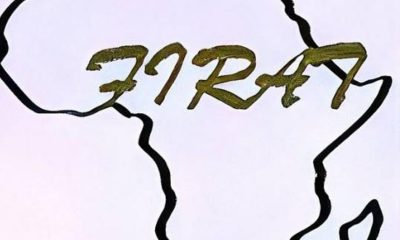
 News4 days ago
News4 days agoFIRAT Offers USD 200,000 SnapGenius Research Facility To Boost Research Excellence In African Universities
-
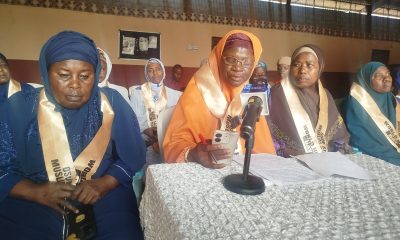
 News5 days ago
News5 days ago2026 World Hijab Day: Osun Muslim Women Decry Discrimination, Demands Protection Of Hijab Rights
-
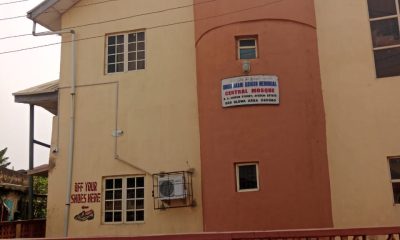
 News4 days ago
News4 days agoPolice Commence Investigation As Worshiper Mobbed To Death At Osogbo Central Mosque
-
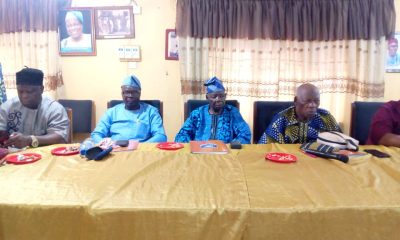
 News4 days ago
News4 days agoPensioners Threaten Legal Action Against States Over Unpaid Pension Increases, Outstanding Entitlements






